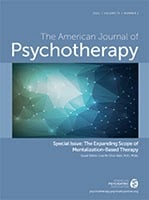Psychotherapies That Address Suicidality Directly or Indirectly Are Comparably Effective

Psychotherapy can be effective at reducing suicidal ideation and suicide attempts in at-risk individuals—even if the psychotherapy does not directly focus on suicidality, according to a meta-analysis published yesterday in JAMA Psychiatry.
Wouter van Ballegooijen, Ph.D., of Amsterdam University Medical Center, and colleagues combined data from 147 clinical studies (totaling more than 11,000 study participants) comparing psychotherapy (such as cognitive behavioral therapy or family therapy) with control treatments and in which suicidal ideation and/or suicide attempts were reported as outcomes. The studies encompassed both psychotherapies directed at suicidality and those that focused on another psychiatric disorder like depression and indirectly addressed suicidality.
Overall, both direct and indirect psychotherapy were associated with comparable, modest reductions in the severity of suicidal ideation. Direct and indirect psychotherapy were also associated with a 28% and a 32% reduced risk of suicide attempt, respectively.
An analysis of individual therapy types suggested that for direct suicide psychotherapy, cognitive-behavioral therapy was most effective at reducing suicidal ideation while dialectical behavior therapy was best at reducing suicide attempt risk—although van Ballegooijen and colleagues cautioned that the sample sizes for individual treatments were small.
“Suicide prevention strategies could make use of indirect effects. The average proportion of individuals with past-year suicide ideation, plans, or attempts seeking or engaging with mental health services is estimated to be around 30%, and perceived stigma is one of the reasons for this low percentage,” the researchers wrote. “[T]reatments targeting less stigmatizing problems may be a way to provide effective interventions to people who would not likely seek treatment for suicidal ideation or self-harm.
“On the other hand, direct interventions may have additional merit for health care professionals, because they could provide tangible tools and strategies and enhance clinicians’ confidence when dealing with suicidal ideation and attempts,” they added.
For related information, see the Psychiatric News article “Innovative Suicide Prevention Program Using Psychotherapy Shows Early Success.”
(Image: Getty Images/iStock/ZeynepKaya)
Don't miss out! To learn about newly posted articles in Psychiatric News, please sign up here.





